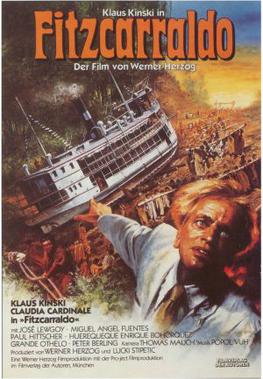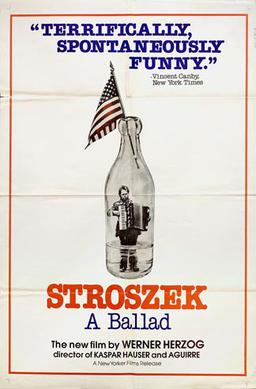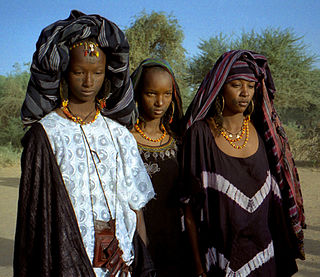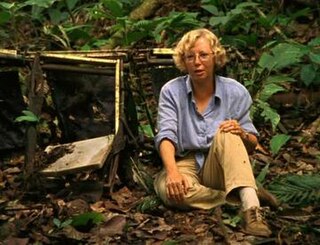
Werner Herzog is a German filmmaker, actor, opera director, and author. Regarded as a pioneer of New German Cinema, his films often feature ambitious protagonists with impossible dreams, people with unusual talents in obscure fields, or individuals in conflict with nature. His style involves avoiding storyboards, emphasizing improvisation, and placing his cast and crew into real situations mirroring those in the film they are working on.

Aguirre, the Wrath of God is a 1972 epic historical drama film produced, written and directed by Werner Herzog. Klaus Kinski stars in the title role of Spanish soldier Lope de Aguirre, who leads a group of conquistadores down the Amazon River in South America in search of the legendary city of gold, El Dorado. The accompanying soundtrack was composed and performed by kosmische musik band Popol Vuh. The film is an international co-production between West Germany and Mexico.

Fitzcarraldo is a 1982 West German epic adventure-drama film written, produced, and directed by Werner Herzog, and starring Klaus Kinski as would-be rubber baron Brian Sweeney Fitzgerald, an Irishman known in Peru as Fitzcarraldo, who is determined to transport a steamship over the Andes mountains to access a rich rubber territory in the Amazon basin. The character was inspired by Peruvian rubber baron Carlos Fitzcarrald, who once transported a disassembled steamboat over the Isthmus of Fitzcarrald.

Even Dwarfs Started Small is a 1970 West German absurdist comedy-drama film written, produced, and directed by Werner Herzog.

Stroszek is a 1977 West German tragicomedy film directed by Werner Herzog and starring Bruno S., Eva Mattes, and Clemens Scheitz. Written specifically for Bruno S., the film was shot in Plainfield, Wisconsin, and North Carolina. Most of the lead roles are played by inexperienced actors.

Werner Herzog Eats His Shoe is a short documentary film directed by Les Blank in 1980, that depicts director Werner Herzog living up to his alleged vow to eat his shoe if Errol Morris ever completed the film Gates of Heaven.

The Wodaabe is a name that is used to designate a subgroup of the Fula ethnic group who are traditionally nomadic found primarily in Niger and Chad. All Wodaabe people should not be mistaken as Mbororo as these are two separate subgroups of the Fulani people. It is translated into English as "Cattle Fulani", and meaning "those who dwell in cattle camps". The Wodaabe culture is one of the 186 cultures of the standard cross-cultural sample used by anthropologists to compare cultural traits. A Wodaabe woman, Hindou Oumarou Ibrahim, was also chosen to represent civil society of the world on the signing of Paris Protocol on 22 April 2016.

How Much Wood Would a Woodchuck Chuck is a 1976 documentary film by German director Werner Herzog, produced by Werner Herzog Filmproduktion. It is a 44-minute film documenting the World Livestock Auctioneer Championship held in New Holland, Pennsylvania. The film also contains a section about the Amish and shows Amish speaking Pennsylvania German.

La Soufrière – Warten auf eine unausweichliche Katastrophe is a 1977 documentary film in which German director Werner Herzog visits an evacuated town on the island of Guadeloupe, where the volcano La Grande Soufrière is predicted to erupt.

Wings of Hope is a 1998 made-for-TV documentary directed by Werner Herzog. The film explores the story of Juliane Koepcke, a German Peruvian woman who was the sole survivor of Peruvian flight LANSA Flight 508 following its mid-air disintegration after a lightning strike in 1971. Herzog was inspired to make this film since he had narrowly avoided taking the same flight while he was location scouting for Aguirre, the Wrath of God; his reservation had been canceled due to a last minute change in itinerary.

Herakles (Heracles) is a 1962 short film and the first film by the German director Werner Herzog, then 19 years old.
Game in the Sand is an unreleased short film written and directed by Werner Herzog in 1964. The plot concerns four children and a rooster in a cardboard box, and includes a scene where the chicken is buried in sand up to its neck. Very little information about the film and its production is known.

Encounters at the End of the World is a 2007 American documentary film by Werner Herzog about Antarctica and the people who choose to spend time there. It was released in North America on June 11, 2008, and distributed by ThinkFilm. At the 81st Academy Awards, the film was nominated for Best Documentary Feature.
![<i>The Unprecedented Defence of the Fortress Deutschkreuz</i> 1967 [[West Germany]] film](https://upload.wikimedia.org/wikipedia/en/thumb/1/14/Unprecedented.jpg/320px-Unprecedented.jpg)
The Unprecedented Defence of the Fortress Deutschkreuz is a 1967 short film by Werner Herzog filmed in 1966 in Deutschkreutz, Austria. Herzog's official website describes the film as "a satire on the state of war and peace and the absurdities it inspires.

The Flying Doctors of East Africa is a 1969 documentary film by Werner Herzog about the "flying doctors" service of the African Medical and Research Foundation in Tanzania and Kenya. The film is a fairly conventional documentary made during the filming of Herzog's more stylized films Fata Morgana and Even Dwarfs Started Small.

Handicapped Future is a 1971 documentary film by Werner Herzog about physically disabled children in Munich.

No One Will Play With Me is a 1976 short film by Werner Herzog. The film focuses on a boy, Martin, who is outcast from the other children at his school. The film was made with pre-school children in Munich, and is partially based on true stories which Herzog heard from the children themselves. The use of a raven as a central plot element was inspired by the story of the raven from Herzog's earlier film The Great Ecstasy of Woodcarver Steiner.

Ballad of the Little Soldier is a 1984 documentary film directed by Werner Herzog and Denis Reichle about child soldiers in Nicaragua. The film focuses on a group of Miskito Indians who used children soldiers in their resistance against the Sandinistas.

The Guérewol is an annual courtship ritual competition among the Wodaabe Fula people of Niger. Young men dressed in elaborate ornamentation and made up in traditional face painting gather in lines to dance and sing, vying for the attentions of marriageable young women. The Guérewol occurs each year as the traditionally nomadic Wodaabe cattle herders gather at the southern edge of the Sahara before dispersing south on their dry season pastures.

Nomad: In the Footsteps of Bruce Chatwin is a 2019 British documentary film by German director Werner Herzog. It chronicles the life of British travel writer Bruce Chatwin and includes interviews with Chatwin's widow, Elizabeth Chatwin, and biographer Nicholas Shakespeare, as well as detailing Herzog's own friendship and collaboration with the man.












![<i>The Unprecedented Defence of the Fortress Deutschkreuz</i> 1967 [[West Germany]] film](https://upload.wikimedia.org/wikipedia/en/thumb/1/14/Unprecedented.jpg/320px-Unprecedented.jpg)





